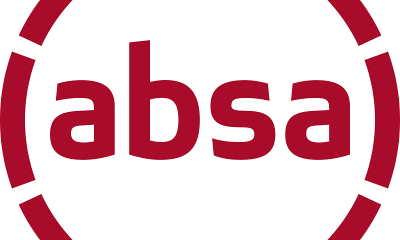Economy
Absa’s Expanding Role in Africa’s Post-Pandemic Recovery Race

The race to rebuild the global economy after the lockdowns is gathering pace. The spike in inflationary trends, disturbing food insecurity levels, failing channel management systems, the sharp increase in the number of businesses going bust, and alarming infrastructure deficit form the recent consequences of the COVID-19 outbreak.
Hence, development agencies and state economic managers on global and regional scales have sprung into action to revive the hailing economies. Recovery aids, financing instruments are being sourced to balance up the intervention policies developed across markets to stimulate quick recovery from the various shocks of the viral outbreak.
Africa, home to over 1.2 billion people, is striving hard to meet its obligations of catering to the food needs of the burgeoning population as well as closing the massive infrastructure deficit evidenced by the inconsistent supplies of electricity, decaying road transport systems, low internet penetration level, growing unemployment rate and faulty municipalities across its 30.3 million km2 surface areas.
According to the German Institute for Global and Area Studies (GIGA), the lockdown rules that were implemented across the African continent led to drastic short-term income losses for informal workers as very few of the workers had access to social security protection. Foreign direct investment (FDI) also dropped drastically as trade declined dramatically on the continent while the government capacity to keep the economy active ebbed leaving little or no means of support for the state managers.
A swift rebound from the deep deficits on the continent would require strong public-private partnerships on a socioeconomic level. The private sector which provides as much as 90% of the employment in the economies and plays active roles in implementing key growth policies are a strong driver of national and regional economic agenda. It is hard to imagine a faster post lockdown recovery on a large scale without effectively engaging the private sectors.
Absa, a pan Africa financial institution is spearheading the private sector’s interventions to stimulate swifter recovery in trade, investment and infrastructure development. The bank is deploying its wider operating capability, well-tailored offerings and experience on a global scale to support the various post lockdown recovery efforts embarked upon by some state actors.
One of the recent moves made by Absa to shore up efforts to rebuild the African economy is a collaborative agreement with Proparco, a French development finance institute, to help corporate SMEs recover from the lockdown’s shocks.
The collaborative economic support agreement aims to source and disburse $20 million to SMEs operating in sectors such as construction, manufacturing, tourism, retail, which have been badly hit by the Covid-19 crisis especially in South Africa.
By helping the SMEs segment stay afloat through the provision of accessible loan instruments, Absa is addressing a critical issue on the continent.
Of course, the African SMEs segment played a significant role in the continent’s impressive 5% average growth in the past decade. The segment has been a fitting lever pulled to attract investment to the continent over the years. It also topped other segments in generating employment for the population and tax revenue for various governments.
Therefore, by providing a support framework for the segment through collaborative efforts, Absa is leveraging its impressive developmental network to strengthen a key locus of economic recovery in the post-lockdown operating environment.
Speaking about the collaborative agreement between Proparco and Absa, Parin Gokaldas, Group Treasurer at Absa, said, “The agreement further enables Absa to provide financial support to corporate SMEs, a vital component of the local economy, as it recovers from the impact of the Covid-19 pandemic. We are particularly pleased with the agreement as we view the relationship with Proparco, a significant development finance institution in Africa, as strategically important.”
For Emmanuel Haye, deputy head of the Financial Institutions Debt Group, covering Africa and the Middle East, at Proparco: “…We are delighted to start this partnership with Absa Bank, a key player with a strong pan-African presence and to be part of a much-needed counter-cyclical role.”
In the same vein, Absa was recently involved in raising a $400 million syndicated loan for the Africa Finance Corporation (AFC), a leading infrastructure solutions provider, which targets critical infrastructure development on the continent. The pan African bank, through its Corporate and Investment Banking division, along with a few other global banks, acted as a bookrunner and mandated lead arranger to help the AFC secure the development loan.
The involvement in the syndicate loan arrangement to boost infrastructure development in Africa is another significant intervention effort that speaks to the development focus of the bank.
Banji Fehintola, Senior Director & Treasurer at the AFC, explained, “This loan will be instrumental in working towards plugging the infrastructure gap we are facing on this continent, especially following the damaging effects of the Covid-19 pandemic. We remain committed to partnering with experienced, like-minded organizations to provide sustainable finance for infrastructure development in Africa while achieving the lowest borrowing costs of any institution on the continent.”
Precisely, robust investment in infrastructure development enables trade and creates a vibrant environment that powers businesses. It provides millions of jobs each year in building and maintenance for the local population.
According to a statement released by the AFC recently, the syndicated loan will support Africa’s post-pandemic recovery “through critical development of infrastructure”. Africa no doubt is in need of strong infrastructure development support in raising the standards of road and freight networks, broadband penetration levels, and the upgrading of the continent’s electric power facilities.
Sadiq Abu, Chief Executive Officer, AbsaNigeria said, “As a pan-African financial institution committed to deepen growth and create shared value, Absa is consistently deploying its vast knowledge of the operating environment to support both public and private development actors in stimulating faster post-lockdown economic recovery on the continent.”
Economy
FG Targets Credit Access For 50% Workers By 2030

By Adedapo Adesanya
The Vice President, Mr Kashim Shettima, inaugurated the Board of the Nigerian Consumer Credit Corporation (CREDICORP) and gave a 50 per cent access target for workers, saying consumer credit was critical to Nigeria’s ambition of becoming a one-trillion-dollar economy by 2030.
According to him, President Bola Tinubu established the CREDICORP to build a trusted credit infrastructure, provide catalytic capital to lower borrowing costs, and help Nigerians overcome long-standing cultural resistance to credit.
Speaking on Thursday in Abuja when he inaugurated the board on behalf of the President, the Vice President, in a statement by his spokesman, Mr Stanley Nkwocha, said that the quality of life of Nigerians cannot improve without closing the gap between access to capital and human dignity.
“A civil servant who earns honestly does not have to chase sudden wealth just to buy a vehicle, or save for ten years to buy one. A young professional should not remain in darkness simply because solar power must be paid for all at once,” the Vice President said.
VP Shettima disclosed that in just one year of operations, CREDICORP has disbursed over ₦37 billion in consumer credit to more than 200,000 Nigerians, with over half of them accessing formal credit for the first time.
The Vice President said the organisation was specifically tasked with building credit infrastructure to bridge the trust gap between lenders and borrowers, providing wholesale capital and credit guarantees through its portfolio company.
“Ultimately, these critical jobs of CREDICORP will enable access to consumer credit to at least 50 per cent of working Nigerians by 2030,” he said.
The Vice President explained that the new board’s role was not ceremonial as they are custodians of the organisation’s mission, adding that the long-term strength of the institution would depend on their “vigilance, integrity, sacrifice, and commitment.”
He directed Board members to uphold Public Service Rules, the Board Charter, and all applicable governance frameworks, warning that accountability and stewardship of public resources were non-negotiable.
The Chairman of CREDICORP, Mr Aderemi Abdul, expressed appreciation to President Tinubu for his vision behind the formation of CREDICORP and for the confidence reposed in them, noting that the establishment of the corporation marked an important step towards strengthening the nation’s financial architecture.
He assured President Tinubu that the board understands its responsibility and will guide the institution to deliver meaningful benefits to Nigerians.
For his part, Mr Uzoma Nwagba, Managing Director/CEO of CREDICORP, recalled watching President Tinubu say 20 years ago that consumer credit is one of the major tools that will improve the lives of Nigerians.
He noted that over the past 18 months, the institution has benefited more than 200,000 Nigerians, including students.
He assured that the presidential vision behind CREDICORP would not be taken lightly, as the team considers their appointments a unique, once-in-a-lifetime opportunity.
Other members of the board inaugurated include Mrs Olanike Kolawole, Executive Director, Operations; Mrs Aisha Abdullahi, Executive Director, Credit and Portfolio Management; Mr Armstrong Ume-Takang (MD, MoFI), Representative of MoFI; Mrs Bisoye Coke-Odusote (DG, NIMC), Representative of NIMC; and Mr Mohammed Naziru Abbas, Representative of FMITI.
Others are Mr Marvin Nadah, Representative of FCCPC; Mrs Chinonyelum Ndidi, Representative of the Federal Ministry of Finance; Mr Mohammed Abbas Jega, Independent Director; and Mrs Toyin Adeniji, Independent Director.
Economy
NASD OTC Exchange Rallies 0.23% as Nipco Leads Six Advancers

By Adedapo Adesanya
Six price gainers helped the NASD Over-the-Counter (OTC) Securities Exchange retain its stay in green territory after a 0.23 per cent appreciation on Thursday, February 26.
The price gainers were led by Nipco Plc, which added N25.00 to close at N278.00 per share compared with the previous day’s N253.00 per share, NASD Plc rose by N5.13 to N56.41 per unit versus N51.28 per unit, FrieslandCampina Wamco Nigeria Plc expanded by N2.24 to N102.44 per share from N100.00 per share, Afriland Properties Plc grew by 88 Kobo to N18.88 per unit from N18.00 per unit, 11 Plc increased by 35 Kobo to N277.00 per share from N276.65 per share, and Lagos Building Investment Company (LBIC) Plc gained 27 Kobo to close at N3.75 per unit versus N3.48 per unit.
On the flip side, Central Securities Clearing System (CSCS) Plc lost N1.75 to sell at N68.25 per share versus N70.00 per share, and Geo-Fluids Plc depreciated by 2 Kobo to N3.25 per unit from N3.27 per unit.
The weight of the advancers fortified the NASD Unlisted Security Index (NSI) by 9.21 points to 4,034.46 points from 4,025.25 points, and the market capitalisation soared by N5.51 billion to N2.413 trillion from Wednesday’s N2.408 trillion.
Yesterday, the transaction value jumped by 18.8 per cent to N102.8 million from N80.7 million, and the number of deals surged by 18,8 per cent to 38 deals from 32 deals, while the transaction volume went down by 84.9 per cent to 1.3 million units from 8.7 million units.
At the close of business, CSCS Plc was the most traded stock by value (year-to-date) with 34.2 million units worth N2.04 billion, followed by Okitipupa Plc with 6.3 million units sold for N1.1 billion, and Geo-Fluids Plc with 122.1 million units valued at N478.2 million.
Resourcery Plc remained as the most traded stock by volume (year-to-date) with 1.05 billion units exchanged for N408.7 million, trailed by Geo-Fluids Plc with 122.1 million worth N478.2 million, and CSCS Plc with 34.2 million units traded for N2.04 billion.
Economy
Naira Down Again at NAFEX, Trades N1,359/$1

By Adedapo Adesanya
The Naira further weakened against the Dollar in the Nigerian Autonomous Foreign Exchange Market (NAFEX) for the fourth straight session this week on Thursday, February 26.
At the official market yesterday, the Nigerian Naira lost N3.71 or 0.27 per cent to trade at N1,359.82/$1 compared with the previous session’s N1,356.11/$1.
In the same vein, the local currency depreciated against the Pound Sterling in the same market window on Thursday by N8.27 to close at N1,843.23/£1 versus Wednesday’s closing price of N1,834.96/£1, and against the Euro, it crashed by N8.30 to quote at N1,606.89/€1, in contrast to the midweek’s closing price of N1,598.59/€1.
But at the GTBank forex desk, the exchange rate of the Naira to the Dollar remained unchanged at N1,367/$1, and also at the parallel market, it maintained stability at N1,365/$1.
The continuation of the decline of the Nigerian currency is attributed to a surge in foreign payments that have outpaced the available Dollars in the FX market.
In a move to address the ongoing shortfall at the official window, the Central Bank of Nigeria (CBN) intervened by selling $100 million to banks and dealers on Tuesday.
However, the FX support failed to reverse the trend, though analysts see no cause for alarm, given that the authority recently mopped up foreign currency to achieve balance and it is still within the expected trading range of N1,350 and N1,450/$1.
As for the cryptocurrency market, major tokens posted losses over the last 24 hours as traders continued to de-risk alongside equities following Nvidia’s earnings-driven pullback, with Ripple (XRP) down by 2.7 per cent to $1.40, and Dogecoin (DOGE) down by 1.6 per cent to $0.0098.
Further, Litecoin (LTC) declined by 1.3 per cent to $55.87, Ethereum (ETH) slipped by 0.9 per cent to $2,036.89, Bitcoin (BTC) tumbled by 0.7 per cent to $67,708.21, Cardano (ADA) slumped by 0.6 per cent to $0.2924, and Solana (SOL) depreciated by 0.4 per cent to $87.22, while Binance Coin (BNB) gained 0.4 per cent to sell for $629.95, with the US Dollar Tether (USDT) and the US Dollar Coin (USDC) closing flat at $1.00 each.
-

 Feature/OPED6 years ago
Feature/OPED6 years agoDavos was Different this year
-
Travel/Tourism10 years ago
Lagos Seals Western Lodge Hotel In Ikorodu
-

 Showbiz3 years ago
Showbiz3 years agoEstranged Lover Releases Videos of Empress Njamah Bathing
-

 Banking8 years ago
Banking8 years agoSort Codes of GTBank Branches in Nigeria
-

 Economy3 years ago
Economy3 years agoSubsidy Removal: CNG at N130 Per Litre Cheaper Than Petrol—IPMAN
-

 Banking3 years ago
Banking3 years agoSort Codes of UBA Branches in Nigeria
-

 Banking3 years ago
Banking3 years agoFirst Bank Announces Planned Downtime
-

 Sports3 years ago
Sports3 years agoHighest Paid Nigerian Footballer – How Much Do Nigerian Footballers Earn




















